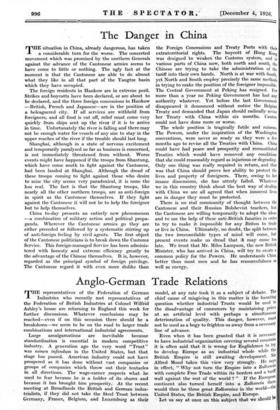The Danger in China
THE situation in China, already dangerous, has taken a considerable turn for the worse. The concerted movement which was promised by the northern Generals against the advance of the Cantonese armies seems to have come to little or nothing. The ugly fact at the moment is that the Cantonese are .able to do almost what they like in all that part of the Yangtze basin which they have occupied.
The foreign residents in Hankow are in extreme peril. Strikes and boycotts have been declared, or are about to be declared, and the three foreign concessions in Hankow —British, French and Japanese—are in the position of a beleaguered city. If all services are withheld from foreigners, and all food is cut off, relief must come very quickly from ships sent up the river if it is to arrive in time. Unfortunately the river is falling and there may not be enough water for vessels of any size to stay in the upper reaches of the river if the trouble should last long.
Shanghai, although in a state of nervous excitement and temporarily paralysed so far as business is concerned, is not immediately threatened from without. Worse events might have happened if the troops from Shantung, which have come south to fight against the Cantonese, had been landed at Shanghai. Although the dread of these troops coming to fight against those who desire to seize the city seems very paradoxical, it is none the less real. The fact is that the Shantung troops, like nearly all the other northern troops, are as anti-foreign in spirit as the Cantonese themselves. If they fight against the Cantonese it will not be to help the foreigner but to help themselves.
China to-day presents an entirely new phenomenon —a combination of military action and political propa- ganda. Wherever the Cantonese armies go they are either preceded or followed by a systematic stirring up of anti-foreign feeling by civil agents. The first object of the Cantonese politicians is to break down the Customs Service. This foreign-managed Service has been adminis- tered with honesty and extreme efficiency greatly to the advantage of the Chinese themselves. It is, however, regarded as the principal symbol of foreign privilege. The Cantonese regard it with even more dislike than the Foreign Concessions and Treaty Ports with their extraterritorial rights. The boycott of Hong Kong was designed -to Weaken- the Customs system, and in various parts of China now, both north and south, the Chinese are trying to take the administration of the tariff into their own hands. North is at war with South, yet North and South employ precisely the same methods in trying to make the position of the foreigner impossible. The Central Government at Peking has resigned. For more than a year no Peking Government has had any authority whatever. Yet before the last Government disappeared it denounced without notice the Belgian Treaty and demanded that Japan should radically revise her Treaty with China within six months. Canton could not have done more or worse.
The whole position is tragically futile and ruinous, The Powers, under the inspiration of the Washington conventions, were never so ready as they were a few months ago to revise all the Treaties with China. China could have had peace and prosperity and reconstituted Treaties which would have removed any conditions that she could reasonably regard as injurious or degrading. Only one thing was really required in return, and that was that China should prove her ability to protect the lives and property of foreigners. There, owing to her insane dissensions, she has utterly failed. Whatever we in this country think about the best way of dealing with China we are all agreed that when innocent lives are in danger they must be protected.
There is no real community of thought between the Cantonese and their Russian Bolshevist teachers, but the Cantonese are willing temporarily to adopt the ideas and to use the help of these anti-British fanatics in order to try to make it impossible for any -Briton to trade or live in China. Ultimately, no doubt, the split between the two irreconcilable types of mind will come, but present events make us dread that it may come too late. We trust that Mr. Miles Lampson, the new British Minister, who has arrived in China, will try to create a common policy for the Powers: He understands China better than most men and he has resourcefulness as well as energy.






























































 Previous page
Previous page